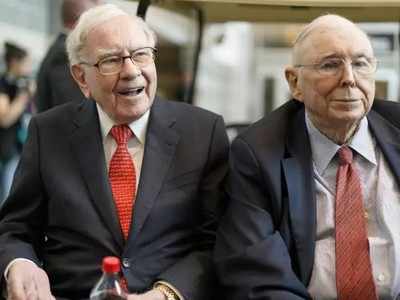- News
- Business News
- India Business News
- Money lessons from Warren Buffett & Charlie Munger
Trending
This story is from May 20, 2019
Money lessons from Warren Buffett & Charlie Munger

Berkshire Hathaway CEO Warren Buffet (left) and vice-chairman Charlie Munger
Key Highlights
- The annual shareholders’ meet of Berkshire Hathaway was like a family gathering, where the elders gave valuable advice to the younger members, says Dhirendra Kumar
- The highlight was an extended Q&A with Buffett and his deputy Charlie Munger
NEW DELHI: Recently, the annual shareholders’ meet of Warren Buffett’s Berkshire Hathaway took place in Omaha. The world’s most famous shareholder’s meet lived up to its billing. There was a large exhibition where shareholders could buy or sample the products of the companies that Berkshire owns. However, the highlight was an extended Q&A with Buffett and his deputy Charlie Munger. Despite the two’s advanced age, the Q&A lasted most of the day.
The questions at the meet came from two sources.One lot was selected from emailed questions by a panel of financial analysts and writers and the second from shareholders at the venue who were selected by lottery. Many of the questions were connected directly to Berkshire’s businesses. However, a good number were general questions about investing or business. In most cases, Buffett and Munger gave long, reasoned answers that often went into the principles underlying what they do.
There was this 27-year-old who said he “wanted to be a great money manager like you two” and wanted advice. Buffett gave a nice long answer but Munger narrated this story: A young man who had asked Mozart about how he could begin composing symphonies. Mozart told the man that at 22 years old, he was too young. “You were writing symphonies when you were 10 years old,” the man protested. “Yes, but I wasn’t running around asking other people how to do it,” Mozart responded.
There was another question whose answer was quite a surprise. A 13-year old boy asked how a young person could develop “delayed gratification”. The child said his father made him watch many videos of the two and told him that was the key to success.
Is this the kind of answer the boy and his father were looking for? I’m not sure. I got the feeling that while both Buffett and Munger gave a genuine and useful answer, it was also an admonishment to the father of the child. Still, an awareness of how delayed gratification is an important part of being successful as an investor is something every saver should give a thought to.
(The author is the founder and CEO of Value Research)
The questions at the meet came from two sources.One lot was selected from emailed questions by a panel of financial analysts and writers and the second from shareholders at the venue who were selected by lottery. Many of the questions were connected directly to Berkshire’s businesses. However, a good number were general questions about investing or business. In most cases, Buffett and Munger gave long, reasoned answers that often went into the principles underlying what they do.
There was this 27-year-old who said he “wanted to be a great money manager like you two” and wanted advice. Buffett gave a nice long answer but Munger narrated this story: A young man who had asked Mozart about how he could begin composing symphonies. Mozart told the man that at 22 years old, he was too young. “You were writing symphonies when you were 10 years old,” the man protested. “Yes, but I wasn’t running around asking other people how to do it,” Mozart responded.
There was another question whose answer was quite a surprise. A 13-year old boy asked how a young person could develop “delayed gratification”. The child said his father made him watch many videos of the two and told him that was the key to success.
Munger’s answer was blunt. Having raised eight children, he said he no longer believed it possible to teach delayed gratification. You are either born with it, or not. Buffett was more circumspect. He said while saving was important, he did not believe that for all families, under all circumstances, saving was the best thing to do. If you postpone a two-day trip to Disneyland and are able to afford a seven-day trip decades later, it may not be the best choice. You don’t see a correlation between money and happiness beyond a certain point.
Is this the kind of answer the boy and his father were looking for? I’m not sure. I got the feeling that while both Buffett and Munger gave a genuine and useful answer, it was also an admonishment to the father of the child. Still, an awareness of how delayed gratification is an important part of being successful as an investor is something every saver should give a thought to.
(The author is the founder and CEO of Value Research)
End of Article
FOLLOW US ON SOCIAL MEDIA















